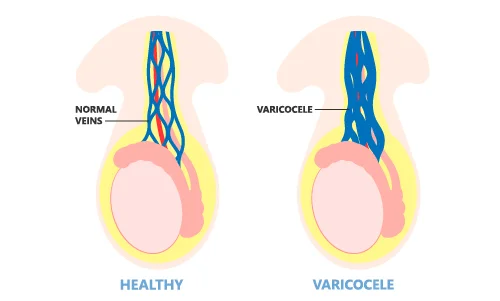Varicocele is a common condition characterised by the enlargement of veins within the scrotum. Complications such as infertility, testicular atrophy, and discomfort can be effectively treated through varicocele repair procedures.
If you're considering varicocele treatment, reach out to us or book a direct appointment with our urologist. At the CK Birla Hospital, we are dedicated to ensuring that your varicocele treatment is as safe, comfortable, and effective as possible. We're here to guide you every step of the way toward a successful recovery.

Varicoceles, which are the enlargement of veins within the scrotum, often occur when blood does not circulate effectively through these vessels. This can lead to pooling and the gradual enlargement of the veins. Despite extensive research, the exact causes of varicoceles remain uncertain, as no established risk factors have been identified.
While varicocele often doesn’t cause symptoms, it can lead to complications if not treated promptly, such as:
Early consultation with a healthcare provider is crucial. Treatment options include observation, medication, or surgery to prevent complications and preserve fertility.
Healthcare professionals use grading systems to identify and assess varicoceles, which are:
Grade 0: This represents the mildest form of varicocele. While it may not be detectable through physical examination, it can be visualised via ultrasound.
Grade I: Varicoceles at this grade may not be visible, but they can be palpated during the Valsalva manoeuvre.
Grade II: Varicoceles of this grade are palpable even without the Valsalva manoeuvre, though they may not be visible.
Grade III: This denotes the most severe varicocele, easily visible and palpable without any special manoeuvre.
Treatment options for varicocele include:
Observation
Some varicoceles may not require immediate treatment if they’re not causing symptoms or fertility issues.
Surgery
Medication
While there are no specific medications for varicocele, pain relief medications may be prescribed.
Assisted Reproductive Techniques (ART)
If varicocele impacts fertility, options like IVF or IUI may be recommended.
Treatment choice depends on factors like symptom severity, fertility concerns, and individual health, necessitating consultation with a healthcare provider.
The advantages of laparoscopic/robotic varicocele surgery over traditional varicocele surgery are summarised below:
| Feature | Laparoscopic/Robotic Surgery | Open Surgery |
| Incision size | Small, keyhole incisions | Larger, single incision |
| Recovery time | Generally shorter | Longer |
| Postoperative pain | Typically less | Typically more |
| Hospital stay | Shorter (often same-day discharge) | Longer |
| Cosmetic result | Minimal scarring | More noticeable scar |
| Return to normal activities | Quicker | Slower |
However, the choice between laparoscopic/robotic and open surgery depends on individual patient factors and surgeon expertise. Each method has its own set of advantages and should be considered in the context of the patient’s overall health and specific circumstances.
Physical exam
Valsalva Maneuver
Scrotal ultrasound
An expansion of the scrotal veins is known as a varicocele. It’s similar to varicose veins that occur in the legs.
Varicoceles typically occur in young men, often during puberty. However, they can develop at any age. Factors such as family history, obesity, and occupations or activities that involve prolonged standing or heavy lifting may increase the risk.
Many varicoceles do not cause symptoms. However, some individuals may experience discomfort or pain in the scrotum, especially after standing for long periods. Additionally, varicoceles can sometimes lead to fertility problems or testicular atrophy (shrinkage).
Yes, varicoceles can potentially impair fertility by causing an increase in scrotal temperature, which can negatively impact sperm production and quality. However, not all varicoceles affect fertility, and many men with varicoceles are still able to father children.
The cost of a varicocele treatment varies as per the specific type of treatment advised by a healthcare provider, such as:
The cost can also vary widely depending on several factors, including the location, the extent of the treatment, the doctor’s experience, and the hospital’s pricing structure.
To get an explicit estimate for the cost of varicocele treatment at the CK Birla Hospital, contact the hospital directly. Additionally, you can consult with our board-certified urologist to discuss your specific needs and receive a personalised quote for the treatment.